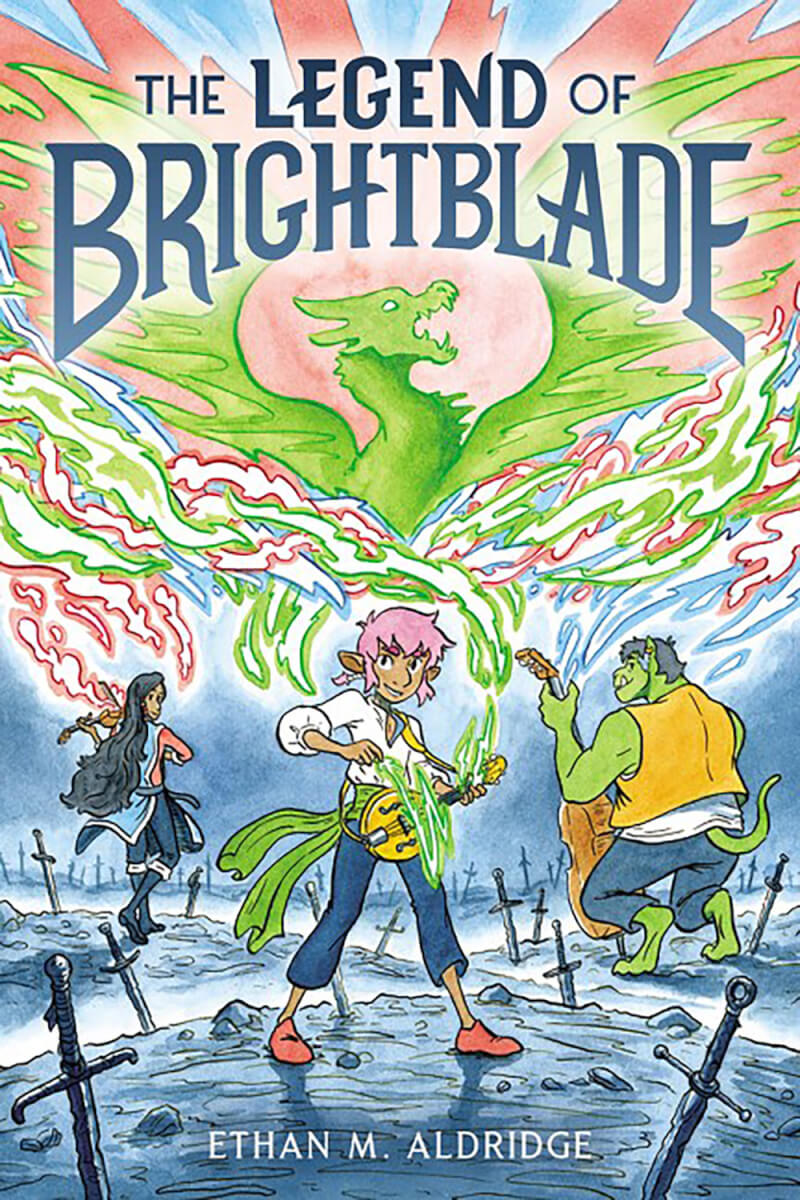Stories have the power to change the world, especially in these captivating fantasy tales. The heroes of these books will enthrall and inspire as they battle dark forces and find their paths.

The Legend of Brightblade
Prince Alto lives in a castle perched on a cliff above the seaside village of Dawn’s Bay. His mother is Lady Brightblade, ruler of the land of Skald, a setting splendidly depicted on a map at the beginning of The Legend of Brightblade, a standalone graphic novel by Ethan M. Aldridge.
Skald is enjoying an era of harmony thanks to victories immortalized in song by Master Eluvian, a gifted magical bard, but Lady Brightblade knows that conflict simmers beneath the surface. She’s determined to reach an agreement with Chief Dagda, leader of the trolls, to ensure that their peoples can safely work together toward continued peace and greater prosperity.
Alto, however, finds all of this boring. He just wants to play his mandolin and refine his magical musicianship abilities so he can be a hero someday, too. He’s fortunate to have Master Eluvian as his teacher, but he’s grown impatient with all the practicing. Alto feels ready to make his mark on the world now! After a frustrating conversation with his mother about his princely duties, Alto sneaks out of the castle, a wide grin on his face as he runs headlong into the life he’s been dreaming of.
At a bustling marketplace, Alto is delighted to meet Ebbe, a troll who also creates magic with her music. He’s less delighted when he crosses paths with an angry bard named Fell, who seems to have malevolent intentions. Soon, Alto feels torn between fulfilling his dream of forming a troupe with Ebbe and another bard, Clarabel, and following his instincts about Fell’s sinister plans alone.
As Ebbe, Clarabel and Alto embark on a cross-country journey, questions mount: Just how angry will Lady Brightblade be at Alto for shirking his royal responsibilities? Will he, Ebbe and Clarabel work well as a trio? And can they stop Fell together before he destroys Skald’s fragile peace?
Aldridge’s detailed watercolor and ink illustrations bring his tale’s magical jam sessions to life in scenes that burst with color. Each musician’s magic has its own shape and hue. When Alto and Ebbe perform together for the first time, their joy is tangible as the swirling green flames of Alto’s magic swoop and dive around the diamond-shaped notes that flow from Ebbe’s cello. It’s just as affecting when Alto witnesses the purple coils of Fell’s magic surround the objects of his wrath.
Fans of fantasy graphic novels, including Aldridge’s Estranged duology, will revel in The Legend of Brightblade’s gentle humor and spirit of adventure. It’s thrilling to watch these young bards compose their own magical destinies.

The Ogress and the Orphans
Newbery Medalist Kelly Barnhill’s The Ogress and the Orphans is at once a lovely fairy tale and a striking allegory, a fantastical story imbued with wonder and warmth that pointedly holds a mirror up to societal dysfunction.
The tale unfolds in the little town of Stone-in-the-Glen, which was a wonderful place to live until its library mysteriously burned down. That devastation proved to be a turning point in the town’s history: After the library, other buildings burned, too. Trees died, floods came, and eventually, the omniscient narrator says, “The whole town seemed to scowl.”
When a dashing newcomer arrived and slayed multiple dragons in short order, the beleaguered townspeople of Stone-in-the-Glen were so relieved that they elected him Mayor. Yet he did not rebuild the town nor foster connections among neighbors, and so the residents of Stone-in-the-Glen became entrenched in their isolation and ennui.
At the Orphan House, however, things are very different. Thanks to Matron, Myron and the 15 children they care for, love still flows through all of its rooms. At the Ogress’ farm on the edge of town, things are different, too. After roaming the world for many human lifetimes, the Ogress has settled down in the hopes of someday feeling that she has found a place to belong. Her best pals, a murder of hilariously self-impressed crows, accompany her on her nighttime trips to anonymously deliver gifts to residents’ doorsteps, a gesture in keeping with her guiding principle, “the more you give, the more you have.”
The orphans’ and the Ogress’ lives collide when young Cass runs away from the Orphan House and is returned safely by the Ogress. To the orphans’ shock, the Ogress is accused of kidnapping, and the townspeople, led by their devious Mayor, are determined to drive her away. They seem immune to facts and evidence, not to mention completely unwilling to listen to children. Barnhill’s solution to this pernicious problem is an exercise in creativity, strategy, kindness and the power of storytelling that is magnificent to behold.
The Ogress and the Orphans is a delight from start to finish. Barnhill writes at a steady, measured pace, and her magic-infused narrative thoughtfully invites readers to ponder the nature of truth, generosity and community.
